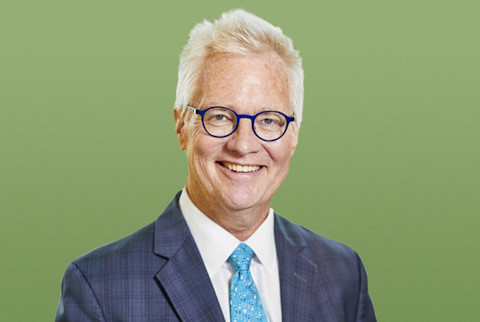The Connection Between Your Gut Microbiome & The Planet's, From An MD

There's so much information to sort through when it comes to supporting immunity. And in the midst of the ever-evolving COVID-19 pandemic? Well, the counsel can change in a day's time.
That's exactly why for this episode of the mindbodygreen podcast we consulted board-certified family physician Patrick Hanaway, M.D., leader of the COVID-19 Task Force at the Institute for Functional Medicine, to discuss everything he knows about strengthening the immune system.
During the interview, we chatted about the usual suspects when it comes to holistic methods—nutrition, herbs, and of course, good ol' vitamin D. But Hanaway mentioned a key factor for immunity that remains largely untapped: Our forests' microbiomes. Here's how the two relate.
So, our forests have microbiomes.
Just like you have trillions of bacteria residing in your gut, the foliage around you has just as many bugs—if not more—that live in each ecosystem. Let's take soil, for instance: The dirt has tons of microbial life, filled with nutrients and healthy minerals that make the vegetables we love so nutritious.
But here's the thing: These forest microbiomes are becoming less and less dynamic1. Our current agricultural methods (like over-tilling and using fertilizers, pesticides, herbicides, and fungicides) are killing more and more of that precious microbial life—similar to how rounds upon rounds of antibiotics can blow through all your healthy gut bacteria. That's why, as functional medicine doctor Mark Hyman, M.D., has previously told us, "The nutritional density of plant foods is 50% less than it was 50 years ago." The plants can't extract the healthy minerals and nutrients they need from the ground—and thus, less-than-stellar veggies.
Here's how that affects your gut microbiome (and immunity).
OK, so the microbial life in our environment is subpar. How does that relate to your own immunity? Well, according to Hanaway, there's a peculiar connection between the two: He mentions that the significant decline in flora and fauna over the years might be directly connected to the loss of diversity in our own microbiomes. Of course, much more research is necessary before we can call causation, but his inference is interesting nonetheless; it does make sense that as the plants you eat contain less and less microbial life, your own microbiome would suffer as well.
And in case you need a reminder: Your gut health has profound impacts on immunity. In fact, about 70% of the body's immune system tissue2 resides in the gut, and anything to disrupt the delicate balance can result in some immune challenges.
So, what does this all mean?
The work becomes twofold: First, according to Hanaway, you still need to focus on strengthening your own gut microbiome, so your body is well-equipped to handle invaders. That said, take the necessary steps for optimal gut health—i.e., pre- and probiotics, fermented foods, and the like. "You have the ability to upgrade your microbiome wherever you're at," Hanaway notes.
However, we also need to focus on strengthening our environment's microbiome—aka, doing what we can to foster a healthy relationship with nature. As Hanaway adds, "COVID and other pandemics that will come are a reflection of this unbalanced relationship we have of trying to control nature rather than being in a relationship with it."
It's a notion immunologist Anthony Fauci, M.D., director of the National Institute of Allergy and Infectious Disease and White House health adviser, agrees with, too: "The COVID-19 pandemic is yet another reminder, added to the rapidly growing archive of historical reminders, that in a human-dominated world, in which our human activities represent aggressive, damaging, and unbalanced interactions with nature, we will increasingly provoke new disease emergences," he writes in a recent3 paper. "We remain at risk for the foreseeable future. COVID-19 is among the most vivid wake-up calls in over a century. It should force us to begin to think in earnest and collectively about living in more thoughtful and creative harmony with nature, even as we plan for nature's inevitable, and always unexpected, surprises."
The takeaway.
When it comes to optimizing your own gut microbiome, you might want to think about the microbiome of the world at large. While it's still important to tend to your own gut health for immune strength, it's time we—for lack of a better expression—see the forest for the trees.
Enjoy this episode sponsored by CVS! And don't forget to subscribe to our podcast on iTunes, Google Podcasts, or Spotify!
